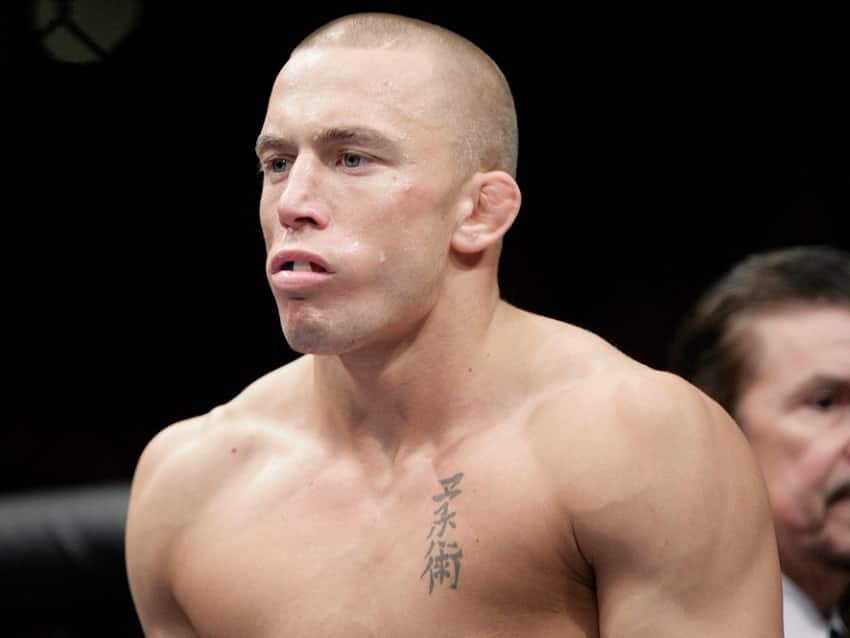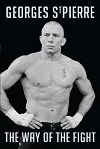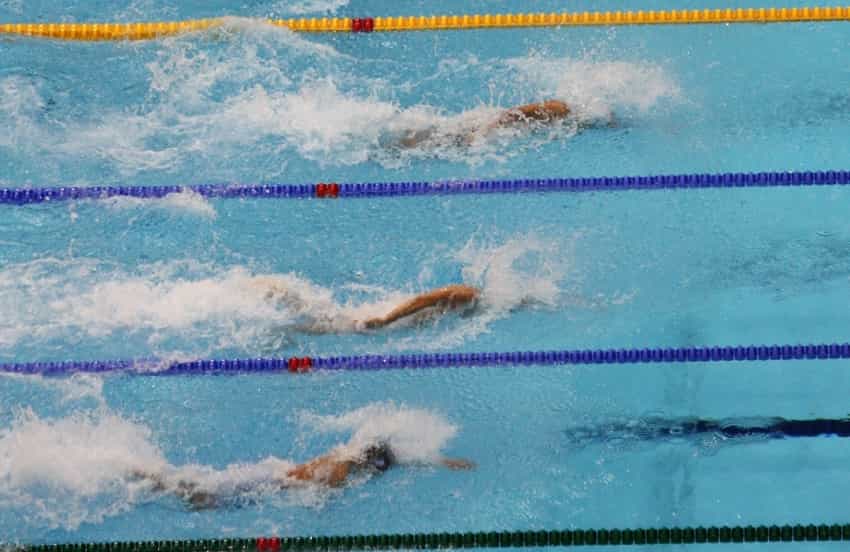Staying present with your thoughts, chasing small victories for motivation, and a devotion to your goals are things all swimmers could use more of right now.
Georges St-Pierre was far from what many view as your stereotypical MMA-knucklehead. He was analytical, exceptionally thorough in his preparation, soft-spoken, and intelligent.
He was relentless in his training, looking for ways to get better that was outside the norm. When he started doing gymnastics, he knew that this would be met with derision from the alpha-types in the MMA community.
But the improvement in his ground game—gymnasts are able to generate terrific power from awkward positions—outweighed the giggles.
In his book, The Way of the Fight (Paperback | Audiobook), St-Pierre talks about his journey to the top of the MMA world, which included a record 9 title defenses and being one of just a handful to hold championship belts in multiple divisions.
There is plenty of advice and knowledge that can be applied to swimmers, including managing fear under pressure, the precious value of having a routine you believe in, and more.
Here are five things swimmers can learn about peak performance from one of the greatest mixed-martial artists of all time, Georges St-Pierre.

You manage your fears and overthinking by staying present.
Fear and performance anxiety are a natural part of competition.
What separates the best from the rest is not that they don’t feel fear, but rather, that they frame fear in a healthy way and stay present while under stress. They are able to use fear to propel them towards a better performance instead of being crippled by it.
Fear of failure has a way of storming on the scene when we are faced with a challenging main set or when we are behind the blocks for our biggest race of the season.
This fear causes our thoughts to time-travel: We begin to dwell on disappointing performances of the past, or we fast-forward with our thoughts to possible worst-case outcomes, heightening the fear we are feeling.
When fear begins to rise in the back of your throat, take a deep breath and stay in the moment.
(If you want to learn more about mindfulness, check out this breakdown of “The Mindful Athlete” I recently put together.)
Progress is industrial-grade motivation.
At some point during your swim career you’ve hit a wall or plateau.
It’s frustrating—a real kick to the pull-buoys when we are going to the pool, putting in the reps, and not seeing results. The drive and motivation naturally flows off the side of a cliff when this happens.
The thought of going to the pool and trying to empty a bottomless barrel of yards and meters is exhausting and quickly leads to an acute case of “screw this.”
The trick is having outlets for improvement and progression outside of what is on the pace clock. After all, you know that you aren’t going to go to the pool each day and swim a new in-practice best time.
Improvement ebbs and flows, and when the times on the clock ebb, it’s time to find those precious progressions elsewhere. A technical improvement. Mastering a new breathing pattern. Tacking a weakness you have been avoiding.
Be relentless about finding things you want to improve in the pool. This mindset will ensure that you will remain motivated to go to the pool, and of course, it will help you swim better and faster, which is the ultimate goal.
Practice deliberately.
How often do you catch yourself going through the motions during swim practice?
Instead of focusing on your technique, or improving your stroke count, or breaking out a smidge further, you are daydreaming or letting your mind wander, you drop precious opportunities to get better.
Concentrating on doing things a bit better for two hours straight is taxing, there is no doubt about it.
But if you want improvement, if you want see progression happen on the clock, you should be practicing at the peak of your ability every time out.
Natalie Coughlin, 12-time Olympic medalist, credits her success to being able to stay extremely focused for long periods of time during practice. Alexander Popov, one of the best freestylers in history, swam with deliberate precision every single day at practice, using the same efficient stroke he would use in competition.
Train deliberately. You are at the pool—may as well maximize the time you spend in it.
The power of little wins.
We all want the overnight success story. The quick commitment. The results without the process.
Few have the patience to stick to the slow and steady approach. Few are interested in checking off the little wins, taking things step by step, methodically working their way towards their goal. It’s the big, violent surge in ability and speed they want. But it doesn’t work this way.
Greatness takes time, patience, and the humility to relentlessly chase the little wins.
On the plus side: Small wins and incremental improvement will keep you motivated longer. Those big, sudden improvements are fun and great and all, but they don’t provide that deep-burning motivation that carries you for the full length of a season.
Add one dolphin kick to your breakout. Eat one extra healthy meal today. Go to bed half an hour earlier each night this week.
Champions are made in the dark.
Personal best times and high-grade awesomeness are developed in the dark, when no one is around to hold you to account.
It’s in these moments you know you are doing it for yourself and not because you “have to” or because someone else expects you to.
When it’s just you, the darkness, and your goals, will you chase them?
*
GSP might have been the man in the octagon, but his lessons in greatness apply to us chlorinated athletes as well.
Here are some parting words from my French-Canadian brethren:

More Stuff Like This:
6 Things Swimmers Can Learn from Michael Jordan. The greatest basketball player of all time has some valuable lessons for swimmers in achieving greatness.














